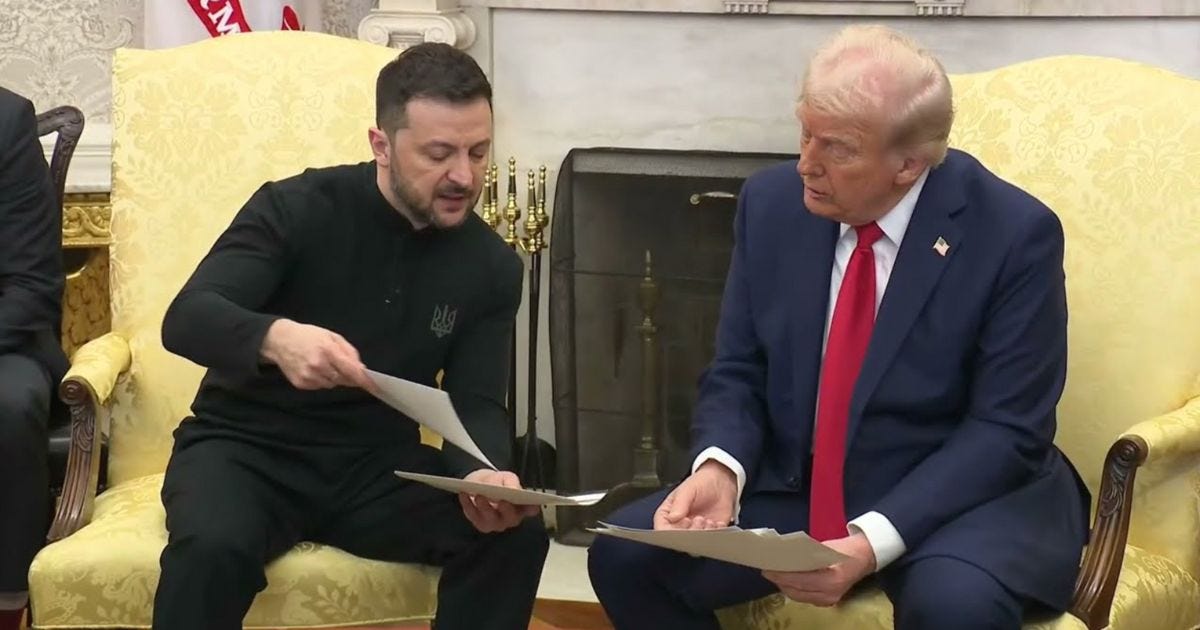Trump and Zelenskyy Clash in Oval Office as Ukraine Tensions Escalate
Power struggles and cultural divides threaten the future of US support for Ukraine.
Cultural divides in power structures, rule application, and time orientation erupt in the Oval Office as Trump and Zelenskyy's shouting match reveals deeper tensions over war, peace, and international obligation.
What's Happening
Ukrainian President Volodymyr Zelenskyy and US President Donald Trump clashed in shouting match over Ukraine war
Trump threatened to withdraw US support if Ukraine doesn't "make a deal" with Russia
Minerals agreement lacks explicit American security guarantees for Ukraine
Vice President JD Vance accuses Zelenskyy of being "disrespectful" for challenging Trump in Oval Office
Trump adopts "much less committed stance toward European security," sending "shockwaves across Europe"
The cultural gap between American presidential leadership and Ukrainian diplomatic expectations creates international tension over the future of European security.
Trump brings a culture of concentrated power (High Power Distance), relationship-based diplomacy (Particularism), and immediate results (Short-Term Orientation).
Zelenskyy's approach represents more balanced power relationships (Moderate Power Distance), consistent rule application (Universalism), and sustainable planning (Long-Term Orientation).
Should international security prioritize powerful nations' immediate goals or uphold long-term, rules-based cooperation? It all depends on your Cultural Perspective.
Why It Matters
Cultural differences in leadership style, rule application, and time orientation are driving the rift between the US and Ukraine, reshaping the transatlantic alliance that has maintained European security since World War II. An alliance the Americans formed and defended for decades.
Understanding these cultural perspectives is crucial to grasping why Trump and Zelenskyy approach international diplomacy so differently—and why this clash has broader implications for global security.
What It Means
Power
Power distance fundamentally shapes how each leader approaches international security commitments.
American culture under Trump embraces America's dominant position. He expects smaller nations to show bow to his demands rather than challenge his authority. His statement that "You're not acting at all thankful" reflects a culture where the stronger party expects explicit gratitude from the weaker one.
This power expectation appears again when Vice President JD Vance interjects that it was "disrespectful" of Zelenskyy to "come to the Oval Office to litigate his position," with Trump immediately agreeing.
American Republican culture views challenging a superior as inappropriate regardless of the argument's substance.
Ukrainian culture seeks more equitable arrangements despite obvious power differences.
Zelenskyy's willingness to directly challenge Trump—even "raising his voice" when accused of ingratitude—shows Ukrainian discomfort with excessive power imbalances. He insists "I said a lot of times thank-you to American people," rejecting the subordinate position Trump attempts to enforce.
The conflict intensifies as Trump threatens "You're either going to make a deal, or we're out."
This reveals how power dynamics directly shape policy decisions between allies and determine who sets the terms of international agreements.
Rules
Different cultural approaches to rule application create fundamental disagreements about how international agreements should function.
Trump’s reliance on a leaders personality prioritizes specific relationships over consistent principles. Trump's clearly softer approach toward Russia, suggesting "Putin wants to make a deal," demonstrates this cultural perspective.
This results in rules and commitments changing based on shifting relationships rather than universal standards. This appears again in Trump's "much less committed stance toward European security" that has "sent shockwaves across Europe."
America’s Republican culture increasingly views previous security arrangements as flexible guidelines rather than binding commitments.
Ukrainian universalist culture expects consistent application of international norms.
Zelenskyy's urging Trump to "make no compromises with a killer" reveals his belief that moral principles should apply regardless of how much someone liked or disliked. This culture expects security guarantees to be honored consistently, not conditionally.
The clash becomes problematic when the minerals agreement "does not include explicit American security guarantees for Ukraine," despite existing alliance expectations.
Trump suggests "the presence of Americans in business would serve as a form of guarantee," showing his comfort with ambiguous, relationship-based assurances rather than explicit commitments.
Time
Time orientation creates strategic differences that fundamentally affect security planning.
American short-term oriented culture focuses on immediate deals and quick conflict resolution. Trump's desire to "quickly wind down the three-year war" shows this cultural tendency.
His focus on seeing "money put to 'different kinds of uses like rebuilding'" demonstrates prioritizing immediate visible outcomes over long-term security concerns.
Ukrainian long-term oriented culture emphasizes sustainable solutions and future security.
Zelenskyy's refusal to "sign an agreement that would put his country in debt for generations" reveals a culture concerned with long-term consequences beyond immediate agreements. Ukraine's hope that "the agreement will spur Trump to back Ukraine's war effort" shows strategic thinking beyond the current crisis.
This divergence creates real strategic challenges when Trump threatens, "if we're out, you'll fight it out. I don't think it's going to be pretty."
America’s new government culture seeks rapid resolution even at the cost of long-term security. Ukrainian culture prioritizes sustainable arrangements that won't leave Ukraine vulnerable to future Russian aggression.
What's Next
These cultural divides will persist throughout diplomatic engagement between the US and Ukraine as both nations work through the widening rift between them.
Tension will continue between America's high power distance approach and Ukrainian expectations for more balanced arrangements.
Ukraine will likely adjust its diplomatic communications to demonstrate more explicit gratitude while seeking to preserve some influence in security decisions.
Disagreement over how international rules should be applied will further strain US-Ukraine relations.
Trump's personality-focused approach to Russia will clash with Ukraine's principle-based concerns.
Ukraine will struggle to secure explicit security guarantees while Trump continues emphasizing deal-making over commitments.
The gap between short-term and long-term thinking will shape how peace negotiations proceed.
Without addressing these fundamental cultural differences, even minor diplomatic engagements will continue to damage the US-Ukraine relationship.





